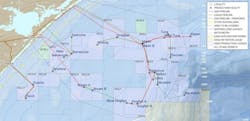NOPSEMA orders ExxonMobil to prepare Bass Strait decommissioning
Australia’s National Offshore Petroleum Safety and Environmental Management Authority (NOPSEMA) has warned ExxonMobil subsidiary Esso Australia to fix Bass Strait corrosion issues and start decommissioning planning of non-operational infrastructure.
The operator has been directed to engage an independent contractor to audit the integrity of the Bass Strait infrastructure and has been given until September 2027 to complete preparatory decommissioning operations. Work includes plugging and abandoning old wells and beginning the dismantling of non-operational platform topsides. Esso also must ensure that all facilities are maintained so that structures and equipment can be safely removed in the future.
Esso and its 50% JV partner BHP began building Bass Strait infrastructure in the mid-1960s with first production in 1969. The JV has since drilled over 400 wells, installed 19 platforms, and laid 600 km of pipelines on the seabed in a vast gathering network that sends oil and gas to the onshore processing plant at Longford in eastern Victoria.
The regulator identified 10 platforms (Kingfish A and B, Mackerel, Fortescue, Flounder, Bream A and B, Whiting, Dolphin, and Perch), six pipelines, and some 180 wells that are no longer in use. Another five platforms are scheduled to cease production around 2025.
NOPSEMA said delays to decommissioning activities will result in deterioration of the infrastructure and jeopardise Esso’s ability to safely carry out the work without increasing environmental risks.
In addition to the audit order, NOPSEMA issued three improvement notices for serious corrosion issues in Tuna and West Tuna infrastructure that require immediate attention.
While Esso has begun plugging non-operational wells, NOPSEMA said the planning and proposed timing for decommissioning work is “not commensurate with the scale of the decommissioning activities required.”
Esso must now report its progress on an annual basis until all decommissioning work has been completed.
NOPSEMA’s directives come on the heels of the Australian government’s tightening of regulations for decommissioning of offshore oil and gas projects.
Esso had previously offered its Bass Strait assets for sale—a move that would have released it from decommissioning liabilities. The company took the assets off the market in November 2020 ahead of the new regulations which introduced a trailing liability rule that could have left Esso liable for decommissioning costs even if the assets were sold (OGJ Online, Nov. 20, 2020).
The government this month revealed a new proposal for a temporary levy on all offshore production to go towards funding decommissioning work, thus putting the onus on the industry and not Australian taxpayers.
